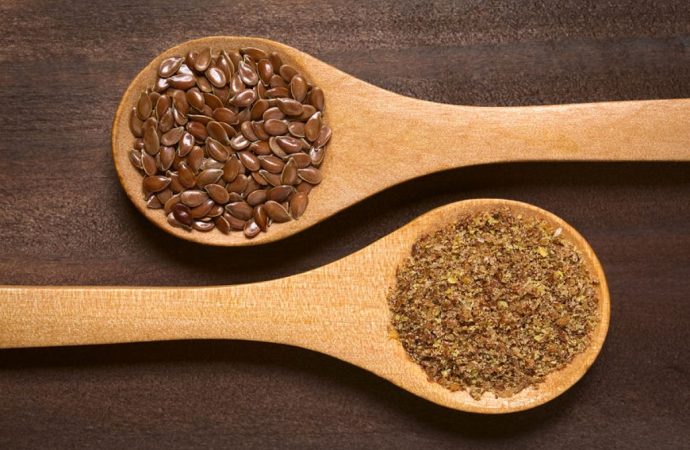Introduction In the realm of superfoods, flaxseeds stand out as tiny powerhouses packed with nutritional benefits. Beyond their well-known omega-3 fatty acids and fiber content, flaxseeds are emerging as dual-action allies, contributing to both gut health and the potential mitigation of breast cancer risks. Join us in unraveling the nutritional prowess of flaxseeds and understanding
Introduction
In the realm of superfoods, flaxseeds stand out as tiny powerhouses packed with nutritional benefits. Beyond their well-known omega-3 fatty acids and fiber content, flaxseeds are emerging as dual-action allies, contributing to both gut health and the potential mitigation of breast cancer risks. Join us in unraveling the nutritional prowess of flaxseeds and understanding their remarkable impact on nourishing the gut microbiome and diminishing the likelihood of breast cancer.
What Makes Flaxseeds Special?
Flaxseeds (Linum usitatissimum) stand out for three main reasons:
- High fiber content: Each tablespoon has about 3 grams of fiber, both soluble and insoluble.
- Omega-3 fats: Flaxseeds are one of the best plant sources of alpha-linolenic acid (ALA), a type of healthy fat.
- Lignans: These plant compounds have antioxidant and estrogen-modulating properties.
Together, these nutrients help your digestive system run smoothly and may influence hormone-related processes tied to breast cancer risk.
The Gut Microbiome and its Significance
The gut microbiome, a complex community of trillions of microorganisms residing in the digestive tract, plays a pivotal role in overall health. A balanced and diverse microbiome is associated with improved digestion, immune function, and even mental well-being. Flaxseeds, with their array of nutrients, have been found to exert positive influences on this intricate microbial community.
1. Flaxseeds: A Nutritional Powerhouse
Before delving into their specific benefits, it’s essential to appreciate the nutritional richness of flaxseeds. These tiny seeds are a concentrated source of omega-3 fatty acids, lignans, fiber, and various vitamins and minerals. This nutritional profile forms the foundation for their potential impact on gut health and breast cancer prevention.
2. Nourishing the Gut Microbiome:
The fiber content in flaxseeds is a key player in promoting gut health. Fiber acts as a prebiotic, serving as fuel for beneficial gut bacteria. As these bacteria digest fiber, they produce short-chain fatty acids (SCFAs), which contribute to a healthy gut environment. Incorporating flaxseeds into the diet supports the proliferation of beneficial bacteria, fostering a balanced and diverse gut microbiome.
3. Lignans and Breast Cancer Prevention:
Flaxseeds are rich in lignans, plant compounds with antioxidant properties. Research suggests that lignans may play a role in reducing the risk of hormone-related cancers, particularly breast cancer. The potential anti-cancer properties of lignans involve their interaction with estrogen receptors, influencing hormonal balance and diminishing the likelihood of breast cancer development.
4. Omega-3 Fatty Acids for Cellular Health:
The omega-3 fatty acids in flaxseeds, specifically alpha-linolenic acid (ALA), contribute to cellular health and may play a role in cancer prevention. While more research is needed to fully understand the relationship between omega-3s and breast cancer, the anti-inflammatory properties of these fatty acids are recognized for their potential health benefits.
Nourishing the Gut Microbiome
1. How Fiber Feeds Friendly Bacteria
Your gut hosts trillions of bacteria that play a key role in digestion, immunity, and even mood. Fiber acts as a “prebiotic,” meaning it feeds the good bacteria in your gut. Flaxseeds provide:
- Soluble fiber, which dissolves in water to form a gel. This slows digestion, helps you feel full, and feeds helpful microbes.
- Insoluble fiber, which adds bulk to stool and promotes regular bowel movements.
When friendly bacteria break down flaxseed fiber, they produce short-chain fatty acids (SCFAs) like butyrate. SCFAs help:
- Strengthen the gut lining
- Reduce inflammation in the digestive tract
- Support healthy immune function
2. Simple Ways to Boost Gut Health with Flaxseeds
- Ground flaxseeds: Always choose ground or milled flaxseeds—whole seeds pass through your system undigested.
- Start small: Add one teaspoon to yogurt or oatmeal. Increase to one or two tablespoons daily.
- Stay hydrated: Fiber needs water to move smoothly through your gut.
Regular intake can improve stool consistency, reduce bloating, and support a balanced gut ecosystem.
Practical Ways to Incorporate Flaxseeds:
- Ground Flaxseeds: To maximize nutrient absorption, grind flaxseeds before consumption. Add a tablespoon of ground flaxseeds to smoothies, yogurt, or oatmeal.
- Flaxseed Oil: Incorporate flaxseed oil into salad dressings or drizzle it over cooked vegetables. This provides a convenient way to enjoy the benefits of flaxseeds.
- Flaxseed Flour: Experiment with flaxseed flour in baking. It can be used as a partial substitute for traditional flour in recipes for added nutritional value.
- Flaxseed Water: Mix ground flaxseeds with water to create a gel-like substance. This can be used as an egg substitute in vegan baking or as a thickening agent in soups and sauces.
Tips for Maximizing Nutrient Absorption
- Grind just before use or buy small packages of pre-ground flaxseeds.
- Store in the fridge to prevent oils from becoming rancid.
- Pair with vitamin C (e.g., a squeeze of lemon juice) to enhance iron absorption from plant sources.
- Balance with other fibers from fruits, vegetables, and whole grains for a diverse gut diet.
Conclusion:
Flaxseeds, with their dual-duty benefits of nourishing the gut microbiome and potentially mitigating breast cancer risks, exemplify the remarkable synergy between nutrition and health. As we continue to explore the intricate connections within our bodies, flaxseeds emerge as versatile allies in the quest for overall well-being. Whether sprinkled on yogurt, stirred into a smoothie, or added to baked goods, the inclusion of flaxseeds in your diet opens the door to a wealth of nutritional advantages. Embrace the tiny yet mighty flaxseed and harness its potential to support a flourishing gut microbiome and reduce the risk of breast cancer, contributing to a holistic approach to health and vitality.

















Leave a Comment
Your email address will not be published. Required fields are marked with *